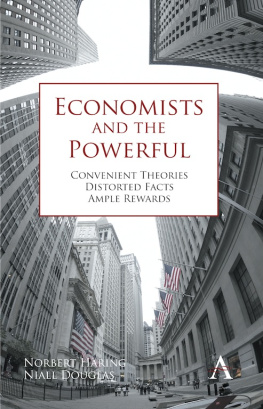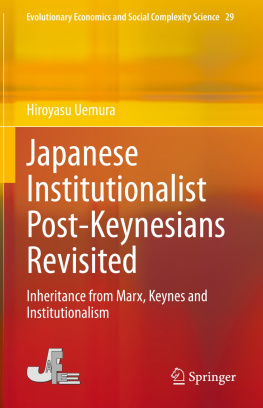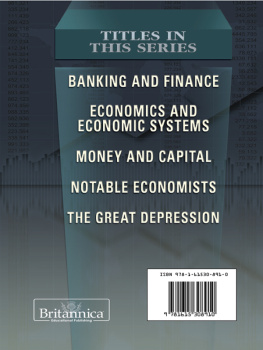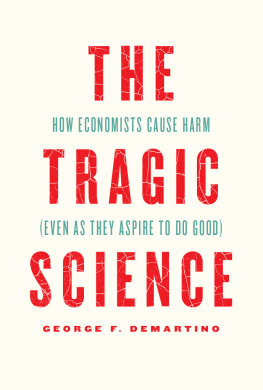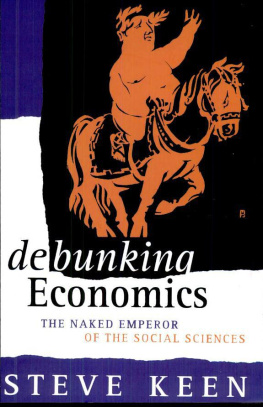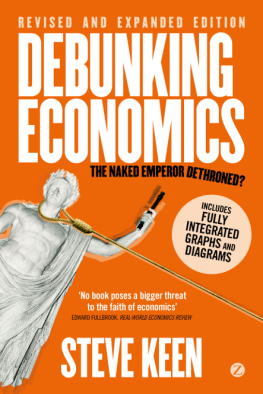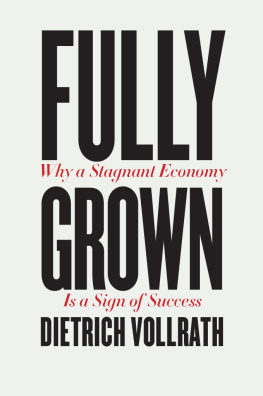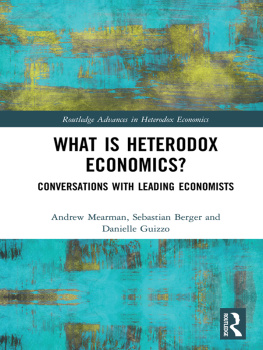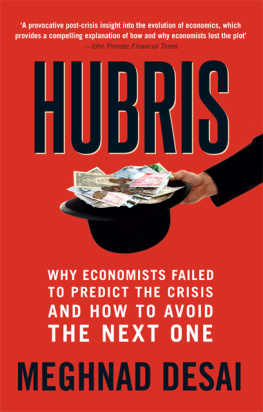Anthem Press
An imprint of Wimbledon Publishing Company
www.anthempress.com
This edition first published in UK and USA 2012
by ANTHEM PRESS
75-76 Blackfriars Road, London SE1 8HA, UK
or PO Box 9779, London SW19 7ZG, UK
and
244 Madison Ave. #116, New York, NY 10016, USA
Copyright Norbert Hring and Niall Douglas 2012
The moral right of the authors has been asserted.
All rights reserved. Without limiting the rights under copyright reserved above,
no part of this publication may be reproduced, stored or introduced into
a retrieval system, or transmitted, in any form or by any means
(electronic, mechanical, photocopying, recording or otherwise),
without the prior written permission of both the copyright
owner and the above publisher of this book.
British Library Cataloguing-in-Publication Data
A catalogue record for this book is available from the British Library.
Library of Congress Cataloging-in-Publication Data
Hring, Norbert.
Economists and the powerful : convenient theories, distorted facts,
ample rewards / Norbert Hring and Niall Douglas.
p. cm.
Includes bibliographical references and index.
ISBN 978-0-85728-546-1 (alk. paper) ISBN 978-0-85728-459-4 (pbk. :
alk. paper)
1. Economics. 2. Power (Social sciences) 3. Executives. I.
Douglas, Niall. II. Title.
HB71.H395 2012
330dc23
2012016685
ISBN-13: 978 0 85728 546 1 (Hbk)
ISBN-10: 0 85728 546 7 (Hbk)
ISBN-13: 978 0 85728 459 4 (Pbk)
ISBN-10: 0 85728 459 2 (Pbk)
This title is also available as an eBook.
This ebook was produced with http://pressbooks.com.
Introduction
Whether you can observe a thing or not depends on the theory which you use. It is the theory which decides what can be observed.
Albert Einstein, 1926
Americans often feel exasperated with the economic intransigence of their continental European cousins. To a typical American, the typical non-English speaking European often seems obsessed with big government, large welfare systems and making it hard to do business by interfering with capitalism. In fact, despite much rhetoric to the contrary, even Anglo-Saxon Britain is right in the middle of big-government, large-welfare European countries. The scale to which Europeans have directed economic resources toward this goal is staggering: between 20042009, Europe was a lifestyle superpower that expended 2.6 trillion (US$3.42 trillion) per annum on social protection, equal to 58 percent of the global spend, which for the rich European countries was around one-fifth of each member countrys gross domestic product (GDP) (Gill and Raiser 2012). As a comparator, in 2010 the US achieved its military superpower status through 43 percent of the global military spend, more than the next 15 largest spenders combined, but costing just US$689 billion (Gill and Raiser 2012).
There is, of course, a rationale behind the European pattern of expenditure. Nowhere else in the developed or developing world, apart from Japan, are disability-adjusted life expectancies so high, income and educational inequalities so low, old age provision so generous, fossil fuel efficiency so high, nor regional economic convergence so typical (Gill and Raiser 2012). Despite the apparent emphasis on the equality of outcome (rather than on opportunity), every known empirical measure shows the equality of opportunity in continental Europe to be among the best in the world and much better than in the United States, despite Americans enduring and irrational belief to the contrary. There is ample empirical evidence suggesting that the European approach is much better economically than is typically thought by the Anglo-Saxon economic discourse. By reading this book you will gain a good introduction to this evidence from a European perspective. The wide disparity in approach to social protection by European countries is not frequently realized outside European discourse, despite the very similar net expenditure levels as a percentage of national GDP. In truth, rather than being as economically intransigent as they usually seem to non-Europeans, European countries have in fact been experimenting for 50 years with a variety of different forms of capitalism.
Although Asians and Latin Americans admire US economic power, as a result of the ever-increasing empirical evidence they rarely choose to use their new wealth to copy the US social model. Almost always, they choose as Europe has: tax personal income and consumption heavily but personal investment and company income lightly. They ensure that the well-to-do receive welfare entitlements just as the poor do. They ameliorate the cost of government bureaucracy by automating and streamlining it, rather than pretending to eliminate it in showy gestures while actually building an even bigger state. Over the past 15 years, European governments have been actively and successfully shrinking themselves unlike the US government which has grown in proportion to the economy. They try to eliminate the free rider problem by mandating participation in endeavors beneficial to society, and they try to diffuse professions such as doctors, lawyers and especially bankers from using their power to extract unfair, outsized economic rents from society. This is smart, evidence-based, practical government, rather than large or small ideological government. Yet you will not hear about any of this in the conventional US economic discourse. This is because of the power of the vested interests who want to distract you from realizing the extent to which they have captured government and economic opportunity for themselves. They tax the middle class, destroy their job security, steal from their pensions and divert those monies into capital gains, tax breaks, perks and freebies for themselves. What is being done to the American middle class is an exercise of power by a ruling elite just as morally corrupt and tyrannical as the European monarchies of old.
Power. It is ubiquitous, yet mainstream economics despite having been made into a Cold War weapon by the US is highly limited and one-sided in how it models power relations. Monopolists and unions are always bad. Consumption and competition are always good. Taxes are always bad. More money is always good. Government is held to be coercive, so it is generally bad. Markets are held to mean freedom, so they are generally good.
As you will discover from reading this book, economics has been molded typically to benefit the wealthy and the interests of the elite of the United States. Just as with the US political system, economics has been captured by the powerful and they are not in the mood for fairness. They are not even in the mood for discussion: you will not find academic articles about fairness in the top economics journals. Only through having been caught so blatantly with their noses in the troughs (e.g. the 2011 Academy Awardwinning documentary Inside Job) has the American Economic Association finally been forced to adopt an ethical code, and that code is weak and incomplete compared with other disciplines. Increasingly, and especially during the past ten years, there is evidence that the US is beginning to doctor the numbers for measures such as productivity and GDP to make itself look stronger and more powerful than it actually is. In this it is copying its forebear, the British Empire, which increasingly began to tell itself lies as it failed to arrest its relative economic decline after the recession of 187379, until the Second World War bankrupted and broke up its global hegemony.

